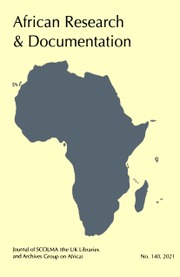No CrossRef data available.
Article contents
Conditions of production for writing, publishing and studying literature in africa: the Nigerian situation
Published online by Cambridge University Press: 25 April 2022
Extract
Text of contribution to a panel discussion on “Conditions of Production for Writing and Publishing in Africa” at a postgraduate seminar, Faculty of English, University of Cambridge, 1 February 2006, revised for a SCOLMA seminar with the present title at the Institute of Commonwealth Studies, University of London, 21March, 2006.
Quite apart from claims made for Cyprian Ekwensi as the first Nigerian to publish a full-length novel in “modern English” (that is his 1954 novel, People of The City), it is generally accepted that Amos Tutuola's The Palm-wine Drinkard was the first novel in any variety of English to be published by a Nigerian. That novel was incidentally published in 1952 by Faber and Faber in the UK. Perhaps this has not after all turned out to be a good omen for publishing in Nigeria.
- Type
- Articles
- Information
- Copyright
- Copyright © International African Institute 2006




